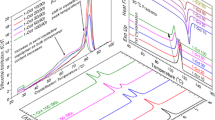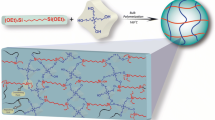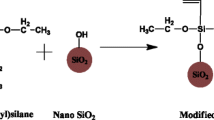Abstract
Acrylic oligomers such as pentaerythritolacrylates (PEA), which are often utilized in the field of functionalized materials, generally consist of very complex homologous series. In this work, measuring conditions for packed-column supercritical fluid chromatographic separation of a complex PEA sample manufactured industrially were systematically examined using temperature programming or modifier gradient technique. Under the conditions thus optimized, not only the main components, PEA homologues containing different number of acryloyl groups, but also trace constituents such as their by-products formed through Michael addition reactions were favorably resolved on the resulting chromatograms. The fact that the coefficient of variation (CV) for relative intensity of each peak was approximately 3–6% even for the minor components suggested that detailed compositional analysis of PEAs could be performed precisely by the proposed method.
Similar content being viewed by others
References
F. P. Schmitzs and E. Klesper, J. Supercritical Fluids, 1990, 3, 29.
K. Ute, “Encyclopedia of Analytical Chemistry”, ed. R. A. Meyers, 2000, John Wiley & Sons, Ltd., Chichester, 8034.
M. J. Carrott and G. Davidson, Analyst, 1999, 124, 993.
“Fractionation by Packed-Column SFC and SFE”, nted. edM. Saito, Y. Yamauchi, and T. Okuyama, 1994, VCH Publishers, New York.
K. Hatada, T. Kitayama, K. Ute, and T. Nishiura, Macromol. Symp., 1998, 129, 89.
K. Hatada, J. Polym. Sci., Part A: Polym. Chem., 1999, 37, 245.
E. Klesper and F. P. Schmitzs, J. Chromatogr., 1987, 402, 1.
G. O. Cantrell, R. W. Stringham, J. A. Blackwell, J. D. Weckwerth, and P. W. Carr, Anal. Chem., 1996, 68, 3645.
W. Zou, and J. G. Dorsey, Anal. Chem., 2000, 72, 3620.
“Supercritical Fluid Chromatography (RSC Chromatography Monograph)”, ed. R. M. Smith, 1988, Chap. 3, Royal Society of Chemistry, London.
“Spectrometric identification of organic compounds”, ed. R. M. Silverstein, G. Clayton Bassler, and C. Terence Morrill, 2nd ed., 1967, John Wiley & Sons Inc., California.
Author information
Authors and Affiliations
Rights and permissions
About this article
Cite this article
Matsunaga, M., Matsushima, Y., Ohtani, H. et al. Optimization of Conditions for Detailed Compositional Analysis of Acrylic Oligomers by Supercritical Fluid Chromatography with Temperature Programming or Modifier Gradient Technique. ANAL. SCI. 17, 1295–1299 (2001). https://doi.org/10.2116/analsci.17.1295
Received:
Accepted:
Published:
Issue Date:
DOI: https://doi.org/10.2116/analsci.17.1295




